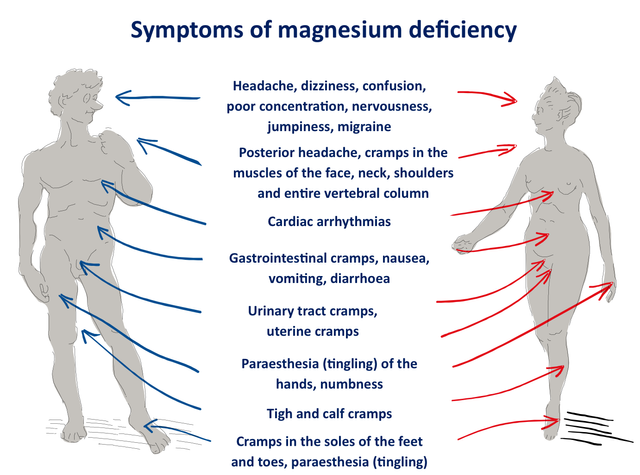Magnesium and why you need it
Author: Dr. Mercola

Magnesium deficiency is extremely common, and recent research shows even subclinical deficiency can jeopardize your heart health. Magnesium is also important for brain health, detoxification, cellular health and function, and the optimization of your mitochondria. In short, magnesium has enormous potential to influence your health and general well-being, especially the prevention of heart disease and cancer, but also for general energy and athletic performance.
Why You Need Magnesium
Magnesium is the fourth most abundant mineral in your body and is involved in more than 600 different biochemical reactions. For example, magnesium plays an important role in:
*Creation of adenosine triphosphate (ATP), the energy currency of your body1,2
*Metabolism of calcium, potassium, zinc, phosphorous, iron, sodium, hydrochloric acid, acetylcholine and nitric oxide, as well as 300 enzymes and the activation of thiamine.3
*Magnesium is also required for DNA, RNA and protein synthesis and integrity,4 and plays a role in the creation of chromosomes5
*Mitochondrial function and health. Magnesium is required both for increasing the number of mitochondria in your cells and for increasing mitochondrial efficiency
*Regulation of blood sugar and insulin sensitivity, which is important for the prevention of Type 2 diabetes6,7,8,9 (In one study,10 prediabetics with the highest magnesium intake reduced their risk for blood sugar and metabolic problems by 71 percent)
*Relaxation of blood vessels and normalizing blood pressure
*Detoxification, including the synthesis of glutathione, considered by many to be your body's most powerful antioxidant
*Muscle and nerve function, including the action of your heart muscle
*Antioxidant defense via a number of different mechanisms, including anti-inflammatory activity and support of endothelial and mitochondrial function
*Maintenance of ionic gradients - keeping intracellular sodium and calcium low and potassium high - and maintaining cellular and tissue integrity12
*Catalyzing mood-regulating neurotransmitters like serotonin, which helps prevent anxiety and depression. It also provides mental and physical relaxation and is considered an important stress antidote13
*Lowering the damage from electromagnetic fields (EMF) by blocking voltage gated calcium channels
*Supporting healthy brain function. Magnesium acts as a buffer between neuron synapses, particularly those involved with cognitive functions (learning and memory).
*Magnesium "sits" on the receptor without activating it, protecting the receptor from overactivation by other neurochemicals, especially glutamate, an excitotoxin that can harm your brain if it accumulates.
*Magnesium also helps prevent migraine headaches14 by relaxing blood vessels in your brain and acting as a calcium channel blocker
*Even Subclinical Magnesium Deficiency Can Wreak Havoc on Your Heart Health
Since it's required for the healthy function of most cells in your body, a lack of magnesium can lead to significant health problems. Magnesium is particularly important for your heart health, helping you maintain normal blood pressure and protect against stroke. According to a 2013 scientific review,16 which included studies dating as far back as 1937, low magnesium may in fact be the greatest predictor of heart disease - not cholesterol or saturated fat intake. At the time, lead author Andrea Rosanoff, Ph.D., told journalists:17
"These numerous studies have found low magnesium to be associated with all known cardiovascular risk factors, such as cholesterol and high blood pressure, arterial plaque buildup (atherogenesis), hardening of the arteries and the calcification of soft tissues. This means we have been chasing our tails all of these years going after cholesterol and the high saturated-fat diet, when the true culprit was and still is low magnesium."
As explained by British cardiologist Dr. Sanjay Gupta,18 magnesium supports heart health via a number of different mechanisms. For starters, it combats inflammation, thereby helping prevent hardening of your arteries and high blood pressure. It also improves blood flow by relaxing your arteries, and helps prevent your blood from thickening, allowing it to flow more smoothly. All of these basic effects are important for optimal heart function.
A recent paper in the Open Heart journal warns that even subclinical deficiency can lead to cardiovascular problems. According to the authors:19
"... 'Various studies have shown that at least 300 mg of magnesium must be supplemented to establish a significantly increased serum magnesium concentrations ...' In other words, most people need an additional 300 mg of magnesium per day in order to lower their risk of developing numerous chronic diseases.
So while the recommended ... recommended dietary allowance [RDA] for magnesium (between 300 and 420 mg /day for most people) may prevent frank magnesium deficiency, it is unlikely to provide optimal health and longevity, which should be the ultimate goal."
More here: https://www.sott.net/article/377806-Magnesium-and-why-you-need-it-for-optimal-health
Hi! I am a robot. I just upvoted you! I found similar content that readers might be interested in:
https://articles.mercola.com/sites/articles/archive/2018/01/29/how-magnesium-benefits-your-body.aspx